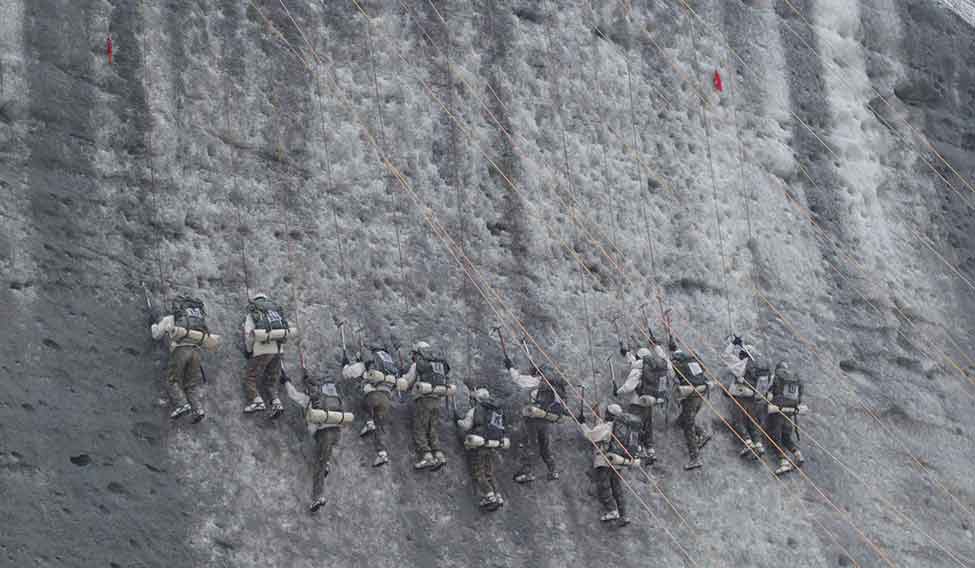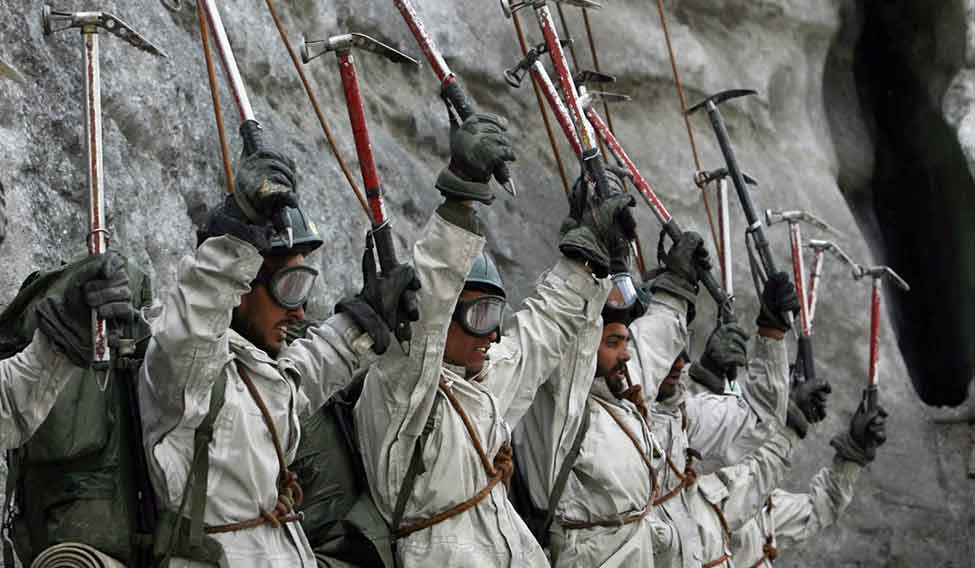Much has been written about the Siachen glacier in the past few days. Statistics and technical terms, however, rarely do justice to what it feels like to be up there. How can words describe the bitter cold slicing through the metal of the lumbering IL 76 aircraft that ferries you to the world's highest killing grounds? Or how it feels to be buffeted and tossed about by turbulence as the aircraft careens through the narrow mouth of the Zojila pass.
How it feels to see grim faces of comrades around you, knowing that some will not return. How the first breath of -30 degrees celsius air feels like inhaling powdered glass, making you choke and bend over. How the numbing cold oozes through the sole of your boots, layers of clothing, skin and gristle, and into your bones within seconds. How your limbs and digits are frozen, and hurt all the time.
How can words describe that sinking feeling when you look at the memorial rock pillars with names of the dead etched all the way up, as far as you can see? Or how your world is perpetually dimmed by the dark glasses you wear so UV rays don’t lacerate your cornea. How it feels to forcibly swallow congealed lumps of canned food, meal after meal, for months on end. How every breath is a struggle because, no matter how deeply you inhale, the thin air cheats you of oxygen. How your head constantly throbs, spins and aches because of the high altitude.
 Climbing an ice wall | AP
Climbing an ice wall | AP
How can words describe the small fibreglass hut, reeking of kerosene and unwashed bodies, that will be your home for a year. A home you share with a dozen other souls sleeping in squashed bunkers that have housed hundreds before you. How you search for a tiny space on the soot-darkened walls, to scratch your name among the hundreds already there. How hygiene is nothing but wiping yourself with a rag dipped in warm water, when you can. How your world is split between the blazing rays of a fierce sun and the perpetual shadows of kerosene lamps.
How every day is a battle to stay alive, every patrol a life-threatening mission. How every step can crack through an ice sheet hiding a crevasse and swallow you forever. How the slightest vibration can set off an avalanche and entomb you under tonnes of rocky ice. And, how a patrol that would take a few hours in any other terrain, takes days because your legs sink all the way to your knees into the subzero snow. What it feels like to carry a load of more than 20 kilos for endless hours, every day, for months, so that rations and fuel are stocked for the winter. How the winters are -45 degrees and “summer” a cruel -35.
 Freezing point: Soldiers hold aloft their ice axes and shout slogans during a training session | PTI
Freezing point: Soldiers hold aloft their ice axes and shout slogans during a training session | PTI
How it feels to be emaciated as low body metabolism wastes your flesh away. How you stop recognising the face in the mirror, with listless eyes surrounded by circles getting darker every day, and bones outlined by papery skin scorched by a sun that is 20,000 feet closer than in the plains. How it feels to have matted hair that can't be cleaned or washed for months, slowly obscuring your face. How it feels to make a choice, in the middle of the night, between emptying your bowels and staying away from the cold.
How it feels to hold the hand of a comrade affected by pulmonary oedema, choking on his own blood, feeling his pain as he crushes your fingers in agony. How it feels to hope against hope that a casualty evacuation chopper would be able to make it in time. And how, deep down, you know it won’t, and your blood brother will die in your arms, slowly, painfully, and there is nothing you can do. Except write down the last words he wheezes through frothing blood— for his family, parents and children. And how you will later lie to them saying he went swiftly, painlessly.
How the thump of an inbound chopper becomes the sweetest sound in the world. How your heart pounds wildly when you hear your only physical link trying to pierce blizzards and gales to reach you. How you pray for the pilot to make it. How you curse him and the world when you hear the rotors veer away because he can't. And how you cheer when he doesn’t give up and approaches you again and again till he lands dangerously, sometimes perched only on one skid—long enough to load a wounded comrade—before being blown away like a mosquito in a storm.
How one day, your tour gets over and the relievers come up to take over the watch from you. How unbelievable it seems that this ordeal is over. How elated you feel as you gather your men for your journey down and how painful that journey is when the men you take back are fewer than those you brought up. And how ironic it feels that the countrymen you do it for will never know what it feels like to lose a part of yourself forever.
That’s how it feels like to be in Siachen or any one of the thousands of posts where our soldiers stand watch.
The author is former CEO of the National Intelligence Grid and group president (risk, security and new ventures), Reliance Industries Limited. Views are personal.






